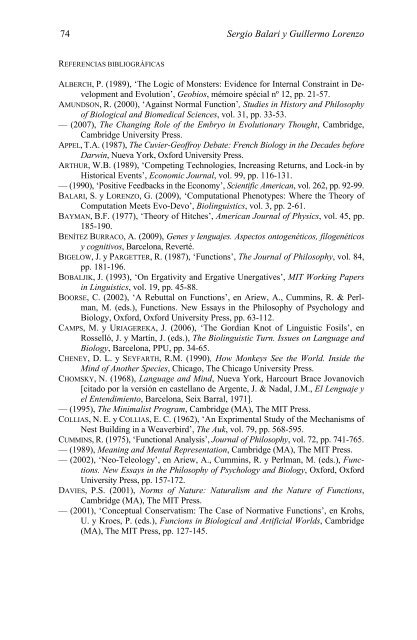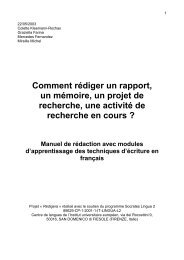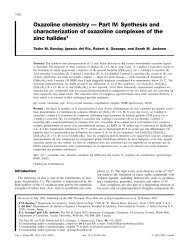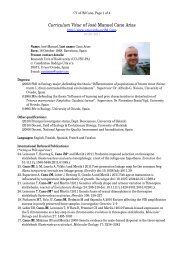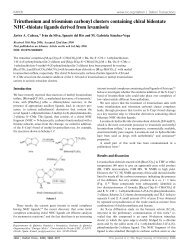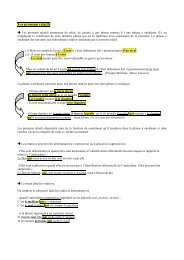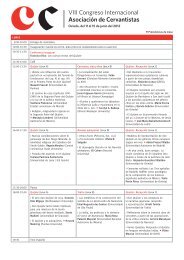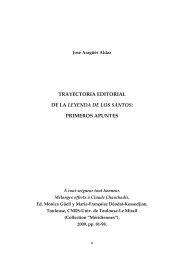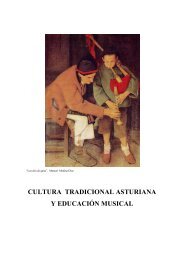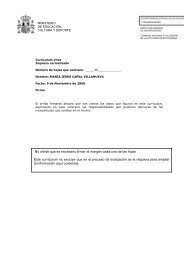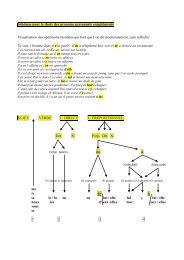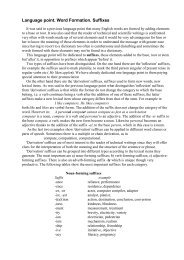¿Para qué sirve un ballestrinque? Reflexiones sobre el ... - Dialnet
¿Para qué sirve un ballestrinque? Reflexiones sobre el ... - Dialnet
¿Para qué sirve un ballestrinque? Reflexiones sobre el ... - Dialnet
You also want an ePaper? Increase the reach of your titles
YUMPU automatically turns print PDFs into web optimized ePapers that Google loves.
74 Sergio Balari y Guillermo Lorenzo<br />
REFERENCIAS BIBLIOGRÁFICAS<br />
ALBERCH, P. (1989), ‘The Logic of Monsters: Evidence for Internal Constraint in Dev<strong>el</strong>opment<br />
and Evolution’, Geobios, mémoire spécial nº 12, pp. 21-57.<br />
AMUNDSON, R. (2000), ‘Against Normal F<strong>un</strong>ction’, Studies in History and Philosophy<br />
of Biological and Biomedical Sciences, vol. 31, pp. 33-53.<br />
–– (2007), The Changing Role of the Embryo in Evolutionary Thought, Cambridge,<br />
Cambridge University Press.<br />
APPEL, T.A. (1987), The Cuvier-Geoffroy Debate: French Biology in the Decades before<br />
Darwin, Nueva York, Oxford University Press.<br />
ARTHUR, W.B. (1989), ‘Competing Technologies, Increasing Returns, and Lock-in by<br />
Historical Events’, Economic Journal, vol. 99, pp. 116-131.<br />
–– (1990), ‘Positive Feedbacks in the Economy’, Scientific American, vol. 262, pp. 92-99.<br />
BALARI, S. y LORENZO, G. (2009), ‘Computational Phenotypes: Where the Theory of<br />
Computation Meets Evo-Devo’, Biolinguistics, vol. 3, pp. 2-61.<br />
BAYMAN, B.F. (1977), ‘Theory of Hitches’, American Journal of Physics, vol. 45, pp.<br />
185-190.<br />
BENÍTEZ BURRACO, A. (2009), Genes y lenguajes. Aspectos ontogenéticos, filogenéticos<br />
y cognitivos, Barc<strong>el</strong>ona, Reverté.<br />
BIGELOW, J. y PARGETTER, R. (1987), ‘F<strong>un</strong>ctions’, The Journal of Philosophy, vol. 84,<br />
pp. 181-196.<br />
BOBALJIK, J. (1993), ‘On Ergativity and Ergative Unergatives’, MIT Working Papers<br />
in Linguistics, vol. 19, pp. 45-88.<br />
BOORSE, C. (2002), ‘A Rebuttal on F<strong>un</strong>ctions’, en Ariew, A., Cummins, R. & Perlman,<br />
M. (eds.), F<strong>un</strong>ctions. New Essays in the Philosophy of Psychology and<br />
Biology, Oxford, Oxford University Press, pp. 63-112.<br />
CAMPS, M. y URIAGEREKA, J. (2006), ‘The Gordian Knot of Linguistic Fosils’, en<br />
Ross<strong>el</strong>ló, J. y Martín, J. (eds.), The Biolinguistic Turn. Issues on Language and<br />
Biology, Barc<strong>el</strong>ona, PPU, pp. 34-65.<br />
CHENEY, D. L. y SEYFARTH, R.M. (1990), How Monkeys See the World. Inside the<br />
Mind of Another Species, Chicago, The Chicago University Press.<br />
CHOMSKY, N. (1968), Language and Mind, Nueva York, Harcourt Brace Jovanovich<br />
[citado por la versión en cast<strong>el</strong>lano de Argente, J. & Nadal, J.M., El Lenguaje y<br />
<strong>el</strong> Entendimiento, Barc<strong>el</strong>ona, Seix Barral, 1971].<br />
–– (1995), The Minimalist Program, Cambridge (MA), The MIT Press.<br />
COLLIAS, N. E. y COLLIAS, E. C. (1962), ‘An Exprimental Study of the Mechanisms of<br />
Nest Building in a Weaverbird’, The Auk, vol. 79, pp. 568-595.<br />
CUMMINS, R. (1975), ‘F<strong>un</strong>ctional Analysis’, Journal of Philosophy, vol. 72, pp. 741-765.<br />
–– (1989), Meaning and Mental Representation, Cambridge (MA), The MIT Press.<br />
–– (2002), ‘Neo-T<strong>el</strong>eology’, en Ariew, A., Cummins, R. y Perlman, M. (eds.), F<strong>un</strong>ctions.<br />
New Essays in the Philosophy of Psychology and Biology, Oxford, Oxford<br />
University Press, pp. 157-172.<br />
DAVIES, P.S. (2001), Norms of Nature: Naturalism and the Nature of F<strong>un</strong>ctions,<br />
Cambridge (MA), The MIT Press.<br />
–– (2001), ‘Conceptual Conservatism: The Case of Normative F<strong>un</strong>ctions’, en Krohs,<br />
U. y Kroes, P. (eds.), F<strong>un</strong>cions in Biological and Artificial Worlds, Cambridge<br />
(MA), The MIT Press, pp. 127-145.


